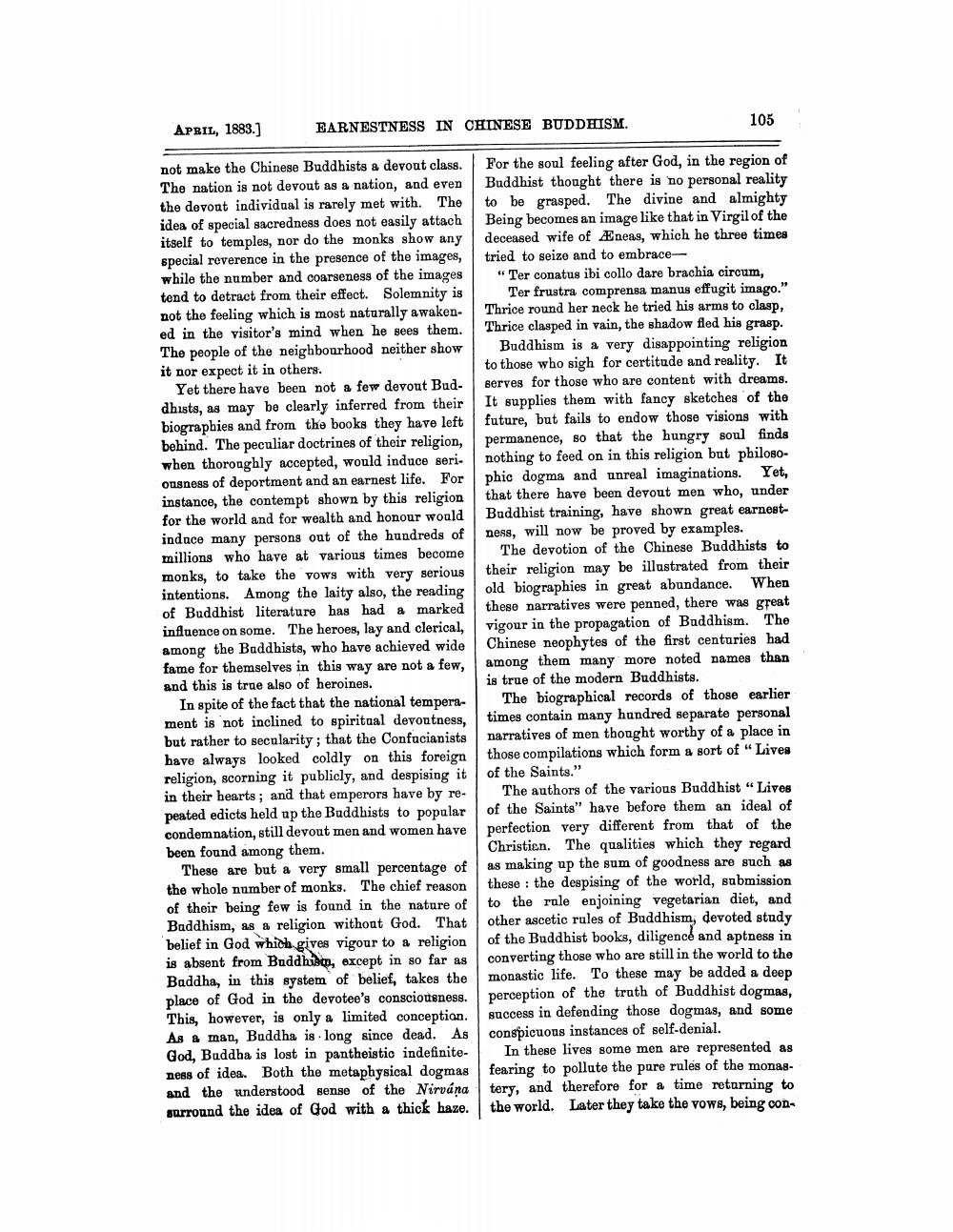________________
EARNESTNESS IN CHINESE BUDDHISM.
APRIL, 1883.]
not make the Chinese Buddhists a devout class. The nation is not devout as a nation, and even the devout individual is rarely met with. The idea of special sacredness does not easily attach itself to temples, nor do the monks show any special reverence in the presence of the images, while the number and coarseness of the images tend to detract from their effect. Solemnity is not the feeling which is most naturally awakened in the visitor's mind when he sees them. The people of the neighbourhood neither show it nor expect it in others.
Yet there have been not a few devout Buddhists, as may be clearly inferred from their biographies and from the books they have left behind. The peculiar doctrines of their religion, when thoroughly accepted, would induce seriousness of deportment and an earnest life. For instance, the contempt shown by this religion for the world and for wealth and honour would induce many persons out of the hundreds of millions who have at various times become monks, to take the vows with very serious intentions. Among the laity also, the reading of Buddhist literature has had a marked influence on some. The heroes, lay and clerical, among the Buddhists, who have achieved wide fame for themselves in this way are not a few, and this is true also of heroines.
In spite of the fact that the national temperament is not inclined to spiritual devontness, but rather to secularity; that the Confucianists have always looked coldly on this foreign religion, scorning it publicly, and despising it in their hearts; and that emperors have by repeated edicts held up the Buddhists to popular condemnation, still devout men and women have been found among them.
These are but a very small percentage of the whole number of monks. The chief reason of their being few is found in the nature of Buddhism, as a religion without God. That belief in God which gives vigour to a religion is absent from Buddhism, except in so far as Baddha, in this system of belief, takes the place of God in the devotee's consciousness. This, however, is only a limited conception. As a man, Buddha is long since dead. As God, Buddha is lost in pantheistic indefiniteness of idea. Both the metaphysical dogmas and the understood sense of the Nirvána surround the idea of God with a thick haze.
105
For the soul feeling after God, in the region of Buddhist thought there is no personal reality to be grasped. The divine and almighty Being becomes an image like that in Virgil of the deceased wife of Eneas, which he three times tried to seize and to embrace
"Ter conatus ibi collo dare brachia circum,
Ter frustra comprensa manus effugit imago." Thrice round her neck he tried his arms to clasp, Thrice clasped in vain, the shadow fled his grasp.
Buddhism is a very disappointing religion to those who sigh for certitude and reality. It serves for those who are content with dreams. It supplies them with fancy sketches of the future, but fails to endow those visions with permanence, so that the hungry soul finds nothing to feed on in this religion but philosophic dogma and unreal imaginations. Yet, that there have been devout men who, under Buddhist training, have shown great earnestness, will now be proved by examples.
The devotion of the Chinese Buddhists to their religion may be illustrated from their old biographies in great abundance. When these narratives were penned, there was great vigour in the propagation of Buddhism. The Chinese neophytes of the first centuries had among them many more noted names than is true of the modern Buddhists.
The biographical records of those earlier times contain many hundred separate personal narratives of men thought worthy of a place in those compilations which form a sort of "Lives of the Saints."
The authors of the various Buddhist "Lives of the Saints" have before them an ideal of perfection very different from that of the Christian. The qualities which they regard as making up the sum of goodness are such as these the despising of the world, submission to the rale enjoining vegetarian diet, and other ascetic rules of Buddhism, devoted study of the Buddhist books, diligence and aptness in converting those who are still in the world to the monastic life. To these may be added a deep perception of the truth of Buddhist dogmas, success in defending those dogmas, and some conspicuous instances of self-denial.
In these lives some men are represented as fearing to pollute the pure rules of the monastery, and therefore for a time returning to the world. Later they take the vows, being con




